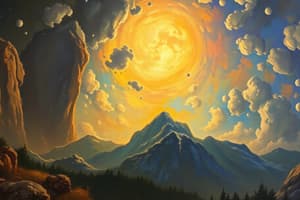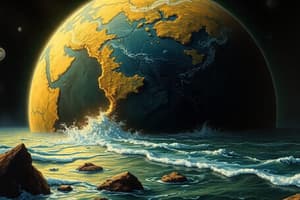Podcast
Questions and Answers
What process describes the theory that life originated from non-living things?
What process describes the theory that life originated from non-living things?
- Spontaneous Generation
- Creationism
- Abiogenesis (correct)
- Panspermia
Which event marked the significant increase of molecular oxygen in the atmosphere?
Which event marked the significant increase of molecular oxygen in the atmosphere?
- Great Oxidation Event (correct)
- Hadean Period
- Late-Ordovician Ice Age
- Cambrian Explosion
During which geological period did the first four-legged amphibians appear?
During which geological period did the first four-legged amphibians appear?
- Devonian Period (correct)
- Triassic Period
- Silurian Period
- Carboniferous Period
What is the primary characteristic of protenoids?
What is the primary characteristic of protenoids?
What biological phenomenon did Louis Pasteur's experiments disprove?
What biological phenomenon did Louis Pasteur's experiments disprove?
What major structure formed during the Permian Period?
What major structure formed during the Permian Period?
Which of the following best describes the Ordovician Radiation?
Which of the following best describes the Ordovician Radiation?
What was a prominent feature of the Triassic Period?
What was a prominent feature of the Triassic Period?
Which of the following organisms emerged during the Cambrian Explosion?
Which of the following organisms emerged during the Cambrian Explosion?
During which period did the first land plants appear?
During which period did the first land plants appear?
Flashcards are hidden until you start studying
Study Notes
Big Bang and Earth's Formation
- Universe began with a rapid expansion from a highly compressed state, lowering density and temperature.
- Formation of Earth involved a disc of gas and dust, which coalesced into clumps of rocks leading to collisions with protoplanets.
Earliest Life Forms
- First life forms were single-celled organisms, marking the origin of biological diversity.
Panspermia
- Hypothesis suggesting that microscopic spores were delivered to Earth from outer space.
Creationism
- Theological and philosophical belief that the universe and life originated from divine creation.
Spontaneous Generation
- Theory proposing that life could arise from non-living matter or separate organisms.
- Supported by Aristotle, who believed in 'vital heat' as a component for life emergence.
Biogenesis
- Concept where life arises from existing living matter.
- Established by Louis Pasteur through experiments disproving spontaneous generation.
Abiogenesis
- Hypothesis that life emerged from non-living matter through complex chemical processes.
- Experiments mimicking early Earth conditions produced organic molecules, including amino acids.
Protenoids
- Protein-like polymers formed by heating a mixture of amino acids.
- In water, protenoids aggregate to create protocells or protobionts (microspheres).
Systematics
- Field aimed at uncovering the origins and evolutionary relationships of organisms.
Geological Time Periods
- Hadean Period: Initial formation of Earth.
- Archean Period: Marked by the emergence of the earliest life forms.
- Great Oxidation Event: Proliferation of cyanobacteria increased atmospheric oxygen levels.
Evolutionary Milestones
- Eukaryotes: First oxygen-dependent animals evolved.
- Cambrian Explosion: Significant diversification of aquatic life including crustaceans, mollusks, and echinoderms.
Supercontinent Formation
- Pannotia split into four continents: Gondwana, Laurentia, Baltica, and Siberia.
Ordovician Radiation
- Sudden increase in marine species, emergence of fish, and first land plants noted.
- Terrestrial arthropods began to invade land.
Ice Ages and Climate Changes
- Late-Ordovician Ice Age: Dramatically lowered sea levels.
Silurian Period
- Growth of early vascular plants and jawed vertebrates; rise in sea levels.
Devonian Period
- Known as the 'Age of Fishes', first four-legged amphibians appeared, along with the first true trees.
Carboniferous Period
- Characterized by rich carbon deposits and diverse plant life, leading to the emergence of various insect species.
- Formation of supercontinent Pangaea began.
Permian Period
- Evolution of supercontinent Pangaea and ocean Panthalassa.
- Rapid evolution of insects and plants; reptiles and synapsids started to appear.
Mesozoic Era
- Triassic Period: Archosaurs dominated, first true mammals arose alongside dinosaurs.
- Jurassic Period: Pangaea split; gymnosperms flourished and dinosaurs thrived with diverse species.
- Cretaceous Period: Development of clams, reptiles, and angiosperms; notable terrestrial creatures included Tyrannosaurus rex and Triceratops.
Cenozoic Era
- Paleogene Period: Continents drifted, leading to the extinction of dinosaurs. Rapid evolution of mammals, including marsupials and primates.
Studying That Suits You
Use AI to generate personalized quizzes and flashcards to suit your learning preferences.





